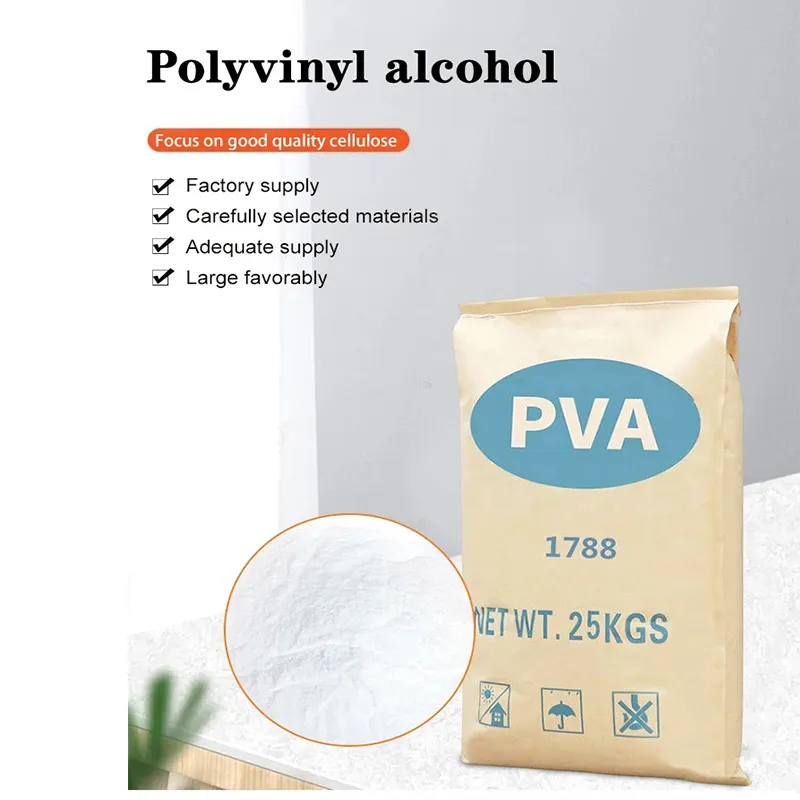Hebei Tangzhi Technology Co., Ltd.

Polyviny Alcohol (PVA)
2월 . 18, 2025 03:03
Back to list
Polyviny Alcohol (PVA)
Polyvinyl alcohol (PVA) stands as a remarkable product with diverse applications spanning multiple industries. This synthetic polymer, characterized by its water solubility and biocompatibility, offers unique advantages that make it indispensable in various sectors such as textiles, papermaking, and medical applications. Delving into the intricate details of PVA unveils how its exceptional characteristics translate into real-world benefits, establishing it as a go-to material for professionals across different fields.
Medicine and healthcare sectors leverage the biocompatible nature of PVA in the development of medical devices and drug delivery systems. Its role in creating contact lenses and artificial organs underscores its reliability and utility, ensuring patient safety and comfort. Medical professionals regard PVA hydrogels for wound dressings and controlled drug-release mechanisms as revolutionary, capitalizing on its non-toxic nature and excellent moisture retention properties, thus promoting faster healing and patient convalescence. In the domain of 3D printing, PVA serves as a water-soluble support material, which is crucial for creating complex geometries without compromising the structural integrity of the finished product. Specialists highlight the ease of use and clean removal of PVA supports, resulting in the production of intricate and precise models without secondary damage. This advancement furthers innovation in manufacturing, making PVA favorable among 3D printing enthusiasts and professionals who seek reliability and quality in rapid prototyping. Through years of empirical research and practical application, PVA has proven its versatility and robustness across domains, fostering an environment of trust among users and experts alike. Institutions and industry leaders continually validate and advocate for PVA’s use, recognizing its exceptional qualities in enhancing product performance and sustainability. This advocacy is deeply rooted in authentic experiences and backed by a wealth of technical data, reinforcing PVA’s esteemed reputation within professional circles and its positive reception in the broader market. As industries evolve with sustainability and efficiency in mind, PVA remains at the forefront, offering proven solutions that marry performance with environmental consciousness. The inherent value of PVA in various fields not only showcases its vital role in industry advancements but also reaffirms its status as a material of choice for tomorrow’s innovations. In embracing PVA, industries not only achieve functional excellence but also spearhead the charge towards a more sustainable and innovative future.


Medicine and healthcare sectors leverage the biocompatible nature of PVA in the development of medical devices and drug delivery systems. Its role in creating contact lenses and artificial organs underscores its reliability and utility, ensuring patient safety and comfort. Medical professionals regard PVA hydrogels for wound dressings and controlled drug-release mechanisms as revolutionary, capitalizing on its non-toxic nature and excellent moisture retention properties, thus promoting faster healing and patient convalescence. In the domain of 3D printing, PVA serves as a water-soluble support material, which is crucial for creating complex geometries without compromising the structural integrity of the finished product. Specialists highlight the ease of use and clean removal of PVA supports, resulting in the production of intricate and precise models without secondary damage. This advancement furthers innovation in manufacturing, making PVA favorable among 3D printing enthusiasts and professionals who seek reliability and quality in rapid prototyping. Through years of empirical research and practical application, PVA has proven its versatility and robustness across domains, fostering an environment of trust among users and experts alike. Institutions and industry leaders continually validate and advocate for PVA’s use, recognizing its exceptional qualities in enhancing product performance and sustainability. This advocacy is deeply rooted in authentic experiences and backed by a wealth of technical data, reinforcing PVA’s esteemed reputation within professional circles and its positive reception in the broader market. As industries evolve with sustainability and efficiency in mind, PVA remains at the forefront, offering proven solutions that marry performance with environmental consciousness. The inherent value of PVA in various fields not only showcases its vital role in industry advancements but also reaffirms its status as a material of choice for tomorrow’s innovations. In embracing PVA, industries not only achieve functional excellence but also spearhead the charge towards a more sustainable and innovative future.
Prev:
Next:
Latest news
-
High-Performance Gypsum Retarder Chemical - Control SettingNewsAug.04,2025
-
Top HPMC Suppliers Enhanced by GPT-4 Turbo | Quality AssuredNewsAug.03,2025
-
High-Performance Concrete Water Reducer Enhanced with GPT-4 TurboNewsAug.02,2025
-
MHEC Cellulose Premium Additive | Enhanced Industrial UsesNewsAug.01,2025
-
Antifoam & Defoamer Solutions | Fast Foam ControlNewsAug.01,2025
-
Hydroxyethyl Cellulose for Paint - Superior Thickening SolutionsNewsJul.31,2025




















